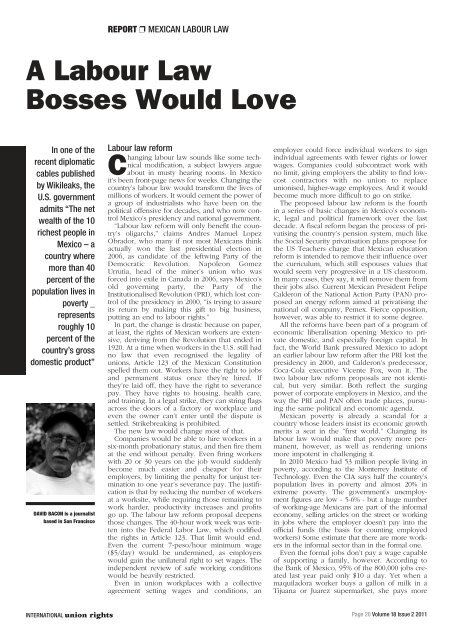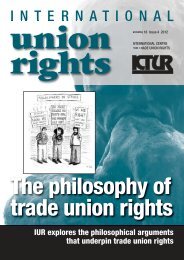REPORT ❐ MEXICAN LABOUR LAWA Labour LawBosses Would LoveIn one of therecent diplomaticcables publishedby Wikileaks, theU.S. governmentadmits “The netwealth of the 10richest people inMexico – acountry wheremore than 40percent of thepopulation lives inpoverty _representsroughly 10percent of thecountry’s grossdomestic product”DAVID BACON is a journalistbased in San FranciscoLabour law re<strong>for</strong>mChanging labour law sounds like some technicalmodification, a subject lawyers argueabout in musty hearing rooms. In Mexicoit’s been front-page news <strong>for</strong> weeks. Changing thecountry’s labour law would trans<strong>for</strong>m the lives ofmillions of workers. It would cement the power ofa group of industrialists who have been on thepolitical offensive <strong>for</strong> decades, and who now controlMexico’s presidency and national government.“Labour law re<strong>for</strong>m will only benefit the country’soligarchs,” claims Andres Manuel LopezObrador, who many if not most Mexicans thinkactually won the last presidential election in2006, as candidate of the leftwing Party of theDemocratic Revolution. Napoleon GomezUrrutia, head of the miner’s union who was<strong>for</strong>ced into exile in Canada in 2006, says Mexico’sold governing party, the Party of theInstitutionalised Revolution (PRI), which lost controlof the presidency in 2000, “is trying to assureits return by making this gift to big business,putting an end to labour rights.”In part, the change is drastic because on paper,at least, the rights of Mexican workers are extensive,deriving from the Revolution that ended in1920. At a time when workers in the U.S. still hadno law that even recognised the legality ofunions, Article 123 of the Mexican Constitutionspelled them out. Workers have the right to jobsand permanent status once they’re hired. Ifthey’re laid off, they have the right to severancepay. They have rights to housing, health care,and training. In a legal strike, they can string flagsacross the doors of a factory or workplace andeven the owner can’t enter until the dispute issettled. Strikebreaking is prohibited.The new law would change most of that.Companies would be able to hire workers in asix-month probationary status, and then fire themat the end without penalty. Even firing workerswith 20 or 30 years on the job would suddenlybecome much easier and cheaper <strong>for</strong> theiremployers, by limiting the penalty <strong>for</strong> unjust terminationto one year’s severance pay. The justificationis that by reducing the number of workersat a worksite, while requiring those remaining towork harder, productivity increases and profitsgo up. The labour law re<strong>for</strong>m proposal deepensthose changes. The 40-hour work week was writteninto the Federal Labor Law, which codifiedthe rights in Article 123. That limit would end.Even the current 7-peso/hour minimum wage($5/day) would be undermined, as employerswould gain the unilateral right to set wages. Theindependent review of safe working conditionswould be heavily restricted.Even in union workplaces with a collectiveagreement setting wages and conditions, anemployer could <strong>for</strong>ce individual workers to signindividual agreements with fewer rights or lowerwages. Companies could subcontract work withno limit, giving employers the ability to find lowcostcontractors with no union to replaceunionised, higher-wage employees. And it wouldbecome much more difficult to go on strike.The proposed labour law re<strong>for</strong>m is the fourthin a series of basic changes in Mexico’s economic,legal and political framework over the lastdecade. A fiscal re<strong>for</strong>m began the process of privatisingthe country’s pension system, much likethe Social Security privatisation plans propose <strong>for</strong>the US Teachers charge that Mexican educationre<strong>for</strong>m is intended to remove their influence overthe curriculum, which still espouses values thatwould seem very progressive in a US classroom.In many cases, they say, it will remove them fromtheir jobs also. Current Mexican President FelipeCalderon of the National Action Party (PAN) proposedan energy re<strong>for</strong>m aimed at privatising thenational oil company, Pemex. Fierce opposition,however, was able to restrict it to some degree.All the re<strong>for</strong>ms have been part of a program ofeconomic liberalisation opening Mexico to privatedomestic, and especially <strong>for</strong>eign capital. lnfact, the World Bank pressured Mexico to adoptan earlier labour law re<strong>for</strong>m after the PRI lost thepresidency in 2000, and Calderon’s predecessor,Coca-Cola executive Vicente Fox, won it. Thetwo labour law re<strong>for</strong>m proposals are not identical,but very similar. Both reflect the surgingpower of corporate employers in Mexico, and theway the PRI and PAN often trade places, pursuingthe same political and economic agenda.Mexican poverty is already a scandal <strong>for</strong> acountry whose leaders insist its economic growthmerits a seat in the “first world.” Changing itslabour law would make that poverty more permanent,however, as well as rendering unionsmore impotent in challenging it.In 2010 Mexico had 53 million people living inpoverty, according to the Monterrey Institute ofTechnology. Even the CIA says half the country’spopulation lives in poverty and almost 20% inextreme poverty. The government’s unemploymentfigures are low - 5-6% - but a huge numberof working-age Mexicans are part of the in<strong>for</strong>maleconomy, selling articles on the street or workingin jobs where the employer doesn’t pay into theofficial funds (the basis <strong>for</strong> counting employedworkers) Some estimate that there are more workersin the in<strong>for</strong>mal sector than in the <strong>for</strong>mal one.Even the <strong>for</strong>mal jobs don’t pay a wage capableof supporting a family, however. According tothe Bank of Mexico, 95% of the 800,000 jobs createdlast year paid only $10 a day. Yet when amaquiladora worker buys a gallon of milk in aTijuana or Juarez supermarket, she pays moreINTERNATIONAL union rights Page 20 Volume 18 Issue 2 2011
than she would on the U.S. side. The price of thatgallon of milk used to be fixed and subsidised,along with tortillas, bus fare and other basicnecessities. Previous waves of economic re<strong>for</strong>msdecontrolled prices and ended consumer subsidies,as Mexico was pressured to create morefavorable conditions <strong>for</strong> private investment.And investors have done very well. In one ofthe recent diplomatic cables published byWikileaks, the U.S. government admits “The netwealth of the 10 richest people in Mexico -- acountry where more than 40 percent of the populationlives in poverty -- represents roughly 10percent of the country’s gross domestic product.”Carlos Slim became the world’s richest man whena previous PRI President, Carlos Salinas deGortari, privatised the national telephone companyand sold it to him. Ricardo Salinas Pliego, whoowns TV Azteca, is now worth $8 billion andEmilio Azcárraga Jean, who owns Televisa, isworth $2.3 billion. Both helped current MexicanPresident Feiipe Calderon get elected in 2006.German Larrea and his company Grupo Mexicogot the concessions to operate some of theworld’s largest copper mines. Grupo Mexico wasaccused of industrial homicide by miners’ unionpresident Gomez Urrutia after 65 people (manyof them contract workers) died in an explosion inFebruary 2006. Since June 2007 the GrupoMexico copper mine in Cananea has been onstrike. Last year Larrea and the Mexican governmentcooperated in using armed <strong>for</strong>ce to open itsgates and bring in strikebreakers.In reality, much of the PRI’s labour law re<strong>for</strong>mis already the reality on the ground in Cananea,at other mines, or among maquiladora workersnear the U.S. Mexico border. For years the rightsof workers in northern Mexico, and even the ruleof law itself, have been undermined by the growingpower of corporations.Corporatism and nationalismThe corporate trans<strong>for</strong>mation of the Mexicaneconomy began long ago, moving the countryaway from nationalist ideas about developmentwhich were dominant from the end of theMexican Revolution through the 1970s.Nationalists advocated an economic system inwhich oil fields, copper mines, railroads, the telephonesystem, great tracts of land, and other keyeconomic resources would be controlled byMexicans and used <strong>for</strong> their benefit.Under President Lazaro Cardenas in the late1930s, Mexico established a corporatist system inwhich one political party, the PRI, controlled themain sectors of Mexican society - workers, farmers,the military and the “popular” sector. PRIgovernments administered a network of socialservices, providing healthcare and housing, atleast <strong>for</strong> people in those organised sectors.Cardenas also nationalised Mexico’s most importantresource - oil - in a popular campaign.National ownership of oil, and later electricalgeneration, was written into the Constitution.Land redistribution and nationalisation had apolitical as well as economic purpose - the creationof a section of workers and farmers whowould defend the government and its politicalparty, into which their unions and producerorganisations were incorporated.After World War Two, Mexico officially adopteda policy of industrialisation through importsubstitution. Factories produced products <strong>for</strong> thedomestic market, while imports of those productswere restricted. The purpose was to develop anational industrial base, provide jobs, andincrease the domestic market. Large state-ownedenterprises eventually employed hundreds ofthousands of Mexican industrial workers in mines,mills, transportation and other strategic industries.Unions had their greatest strength in the publicsector. Foreign investment was limited.Enrique Davila, professor at San Diego CityCollege, calls the system “nationalism in rhetoric,selling out the country in practice.” Under successivePRI administrations a vast gulf widenedbetween the political and economic elite, whomanaged the state’s assets and controlled governmentpolicy in their own interest, and workersand farmers, especially those not in the <strong>for</strong>malsector. To protect this elite, the country’spolitical system became increasingly repressive.In the 1970s, to finance growth while the priceof oil was high, Mexico opened up its financial systemto <strong>for</strong>eign capital (mostly from the U.S.), andthe country’s <strong>for</strong>eign debt soared. Managers ofstate enterprises like the oil company ran privatebusinesses on the side, along with politically connectedunion officials. Rackets and corruption proliferatedwhile labour and campesino leaders whochallenged the system were imprisoned or worse.The debt and the hold it gave to <strong>for</strong>eign financialinterests spelled the end of nationalist development.Oil prices fell, the U.S. Treasury jackedup interest rates and in 1982 the system collapsedwhen Mexico could no longer make debt payments.The government devalued the peso inwhat is still infamous as the great “peso shock.”In the Constitution Mexicans still had the rightto housing, healthcare, employment and education,but millions of people went hungry, had nohomes, were sick and unemployed and couldn’tread. The anger and cynicism felt by manyMexicans toward their political system is in greatpart a product of the contradiction between theconstitutional promises of the revolution a centuryago, plus the nationalist rhetoric that followed,and the reality of life <strong>for</strong> most people.In a desperate attempt to generate jobs and revenue<strong>for</strong> debt payments, the government encouragedthe growth of maquiladoras, the <strong>for</strong>eignownedfactories on the northern border. By 2005over 3000 border plants employed over two millionworkers making products <strong>for</strong> shoppers fromLos Angeles to New York. In 1992 they alreadyaccounted <strong>for</strong> over half of Mexican exports, andin the NAFTA era, became the main sector of theeconomy producing employment growth.Maquiladora development undermined thelegal rights of workers in the border area, andany laws viewed as discouraging investment. Thegovernment had a growing interest in keepingwages low as an attraction to <strong>for</strong>eign investment,instead of high enough that people could buywhat they were making. The old official unions,including the Confederation of Mexican Workers(CTM) controlled restive workers, rather thanorganising them to win better conditions.One of the most important methods of control isthe protection contract. Cooperative unions signagreements with factory owners, who pay it “dues”<strong>for</strong> workers who often have no idea that the unionand contract even exist. They find out quickly,however, when they try to organise any independentef<strong>for</strong>t to raise wages or improve conditions.The company and official union claim a contractalready exists. If workers try to protest, they’reLabour historyin Mexico <strong>for</strong>decades hasbeen dominatedby valiant battlesfought by workersto organiseindependentunions and ridthemselves ofprotectioncontractsPage 21 Volume 18 Issue 2 2011INTERNATIONAL union rights





